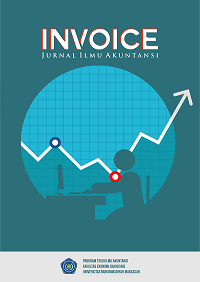MENGGAGAS KODE ETIK AKUNTAN PUBLIK DALAM BINGKAI NILAI KEARIFAN LOKAL BUDAYA BUGIS
DOI: https://doi.org/10.26618/inv.v3i2.6043
Abstract
With knowledge, understanding, a better willingness to apply moral and ethical values adequately to reduce various ethical violations, it is necessary to have an in-depth study from various perspectives on the ineffectiveness of the application of accounting professional ethics in Indonesia. This study wants to provide a new perspective to initiate a code of ethics for public accountants with the perspective of local wisdom values for Bugis culture. This type of research is classified as a qualitative descriptive study using a Postmodern Ethnographic approach. This research data collection method from the results of interviews with informants using Spradley's ethnographic method. The results of this study indicate that the combination of the values of the life of lempu, getteng, warani and acca can strengthen auditors in holding tight to the principles of integrity, objectivity, competence and confidentiality in the code of ethics, which are wrapped in the values of siri 'life that make public accountants professional in carrying out their work and added work motivation with reso life values, all the values of life will be integrated into the soul in a public accountant.
Keywords: Ethics; Code of Ethics; Bugis Cultural Local Wisdom Values.
References
Agoes, S., & Ardana, I. C. (2009). Etika bisnis dan profesi: tantangan membangun manusia seutuhnya. Salemba Empat.
Ahimsa-Putra, H. S. (2009). PARADIGMA ILMU SOSIAL-BUDAYA.
Amrizal, A. (2018). Analisis Kritis Pelanggaran Kode Etik Profesi Akuntan Publik Di Indonesia. Liquidity, 3(1), 36–43. https://doi.org/10.32546/lq.v3i1.103
Arens, A. A., Elder, R. J., & Beasley, M. S. (2008). Auditing dan Jasa Assurance: Pendekatan Terintegrasi Jilid 1 -12/E. Erlangga. https://openlibrary.telkomuniversity.ac.id/pustaka/9540/auditing-dan- jasa-assurance-pendekatan-terintegrasi-jilid-1-12-e-.html
Ariail, D. L., Smith, K. T., & Smith, L. M. (2020). Do United States accountants’ personal values match the profession’s values (ethics code)? Accounting, Auditing & Accountability Journal, 33(5), 1047– 1075. https://doi.org/10.1108/AAAJ-11-2018-3749
Ariyanto, D., Weni Andayani, G. A. P., & Dwija Putri, I. G. A. M. A. (2020).
Influence of justice, culture and love of money towards ethical perception on tax evasion with gender as moderating variable. Journal of Money Laundering Control, 23(1), 245–266. https://doi.org/10.1108/JMLC-06-2019-0047
Azwar, S. (2013). Sikap Manusia Pustaka Pelajar.pdf.
Barrainkua, I., & Espinosa-Pike, M. (2018). The Influence of Auditors’ Commitment to Independence Enforcement and Firms’ Ethical Culture on Auditors’ Professional Values and Behaviour. In Research on Professional Responsibility and Ethics in Accounting (Vol. 21, pp. 17– 52). https://doi.org/10.1108/S1574-076520180000021002
Bertens, K. (2007). Etika. PT. Gramedia Pustaka Utama.
Creswell. (2007). Five Quality Approaches to Inquiry. In Qualitative Inquiry And Research Design: Choosing Among Five Traditions (pp. 53–84). http://www.uk.sagepub.com/upm-data/13421_Chapter4.pdf
Curtis, M. B., & Williams, J. M. (2015). THE IMPACT OF CULTURE AND TRAINING ON CODE OF CONDUCT EFFECTIVENESS: REPORTING OF OBSERVED UNETHICAL BEHAVIOR. In C. Jeffrey
(Ed.), Research on Professional Responsibility and Ethics in Accounting (p. iii). https://doi.org/10.1108/S1574- 076520150000019009
Dewi, K. S. (2012). BUKU AJAR KESEHATAN MENTAL. UPT UNDIP
Press.
Dunn, P., & Sainty, B. (2019). Professionalism in accounting: a five-factor model of ethical decision-making. Social Responsibility Journal, 16(2), 255–269. https://doi.org/10.1108/SRJ-11-2017-0240
Farid, E. A. El. (2016). PENEGAKAN KODE ETIK PROFESI AKUNTAN
PUBLIK. Jurnal Ilmiah Mahasiswa Fakultas Ekonomi Dan Bisnis Universitas Brawijaya, 4(2), 1–17. https://jimfeb.ub.ac.id/index.php/jimfeb/article/view/2886/2583
Finch, N. (2010). Towards an Understanding of Cultural Influence on the International Practice of Accounting. Journal of International Business and Cultural Studies, 2(1), 1–6. http://0- search.proquest.com.innopac.up.ac.za//docview/759646754
Ghozali, I. (2000). TEORI AKUNTANSI INTERNASIONAL FINANCIAL REPORTING SYSTEM (IFRS).
Han Fan, Y., Woodbine, G., & Cheng, W. (2013). A study of Australian and Chinese accountants’ attitudes towards independence issues and the impact on ethical judgements. Asian Review of Accounting, 21(3), 205–222. https://doi.org/10.1108/ARA-04-2013-0027
Hendriksen, E. S., & Breda, M. F. van B. (1992). Accounting Theory.
Homewood,Illinois : IRWIN.
Hofstede, G. (1980). Culture and Organizations. In International Studies of Management & Organization (Vol. 10, Issue 4). https://doi.org/10.1080/00208825.1980.11656300
Ibrahim, A. (2003). Sulesana Kumpulan Esai tentang Demokrasi dan Kearifan Lokal.
INSTITUT AKUNTAN PUBLIK INDONESIA. (2020). Kode etik.
Joseph, G., & Hashmi, A. (2018). Legitimacy and Institutionalization ofCode of Conduct: The Management of Business Ethics. In Research on Professional Responsibility and Ethics in Accounting (Vol. 21, pp. 53–82). https://doi.org/10.1108/S1574-
Keraf, A. S. (2001). Ilmu Pengetahuan. http://kin.perpusnas.go.id/DisplayData.aspx?pId=134776&pRegionCo de=UN11MAR&pClientId=112
Kuncoro, M. (2009). Metode Riset untuk Bisnis & Ekonomi. Erlangga. http://ucs.sulsellib.net//index.php?p=show_detail&id=37139
Downloads
Published
Issue
Section
License
Authors who publish with Invoice: Jurnal Ilmu Akuntansi agree to the following terms:
-
Copyright Ownership
The copyright of all articles published in this journal remains with the author(s). However, the authors grant Invoice: Jurnal Ilmu Akuntansi the right of first publication with the work simultaneously licensed under a Creative Commons Attribution 4.0 International License (CC BY 4.0). This license allows others to share, copy, redistribute, adapt, and build upon the work for any purpose, even commercially, as long as proper credit is given to the original author(s) and the source. -
Licensing and Access
Invoice: Jurnal Ilmu Akuntansi provides immediate open access to its content on the principle that making research freely available to the public supports a greater global exchange of knowledge. All published materials are available freely without subscription or payment and can be accessed, downloaded, and reused by any user provided that appropriate attribution is given. -
Permission for Reuse
For uses not covered by the CC BY 4.0 license, such as commercial reprints, translations, or any form of adaptation without clear attribution, users must obtain written permission from the editorial team. Requests for such permissions can be directed to the editorial office at: [invoice@unismuh.ac.id]. -
Plagiarism and Originality
Authors are responsible for the originality of their submissions. All articles are screened for plagiarism using appropriate tools before acceptance. Manuscripts found to contain unoriginal content or infringing materials will be rejected or retracted as per journal policy.















